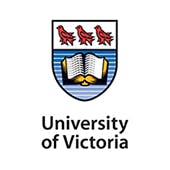Dr. Caren Helbing has a B.Sc. (Hons) in Biological Sciences from the University of Windsor and a Ph.D. in Zoology from Western University. After postdoctoral work in cancer biology at the University of Calgary, she became a faculty member at the University of Victoria in 1999 and is a past Scholar of the Michael Smith Foundation for Health Research Foundation. She is currently Professor in the Department of Biochemistry & Microbiology and directs a productive research group that investigates biomolecules to understand and promote animal (including humans!), environmental, and ecosystem health.
She is the recipient of a NSERC University Faculty Award, the early career award for applied ecological research in 2002 from the Society for Environmental Toxicology and Chemistry, and the Craigdarroch Award for Innovation and Entrepreneurship in 2011 for her contributions in the development of molecular tools for the use on amphibians and other wildlife as indicators of animal health.
Particular focus has been on ways to obtain wildlife health information in minimally invasive ways including development of precision ‘omics and environmental DNA (eDNA) tools for individual and population health assessment, respectively. With 150+ publications and 200+ invited presentations, her program is internationally recognized for uncovering the molecular basis of hormone action using systems, transcriptomics, proteomics, metabolomics, and biochemical approaches and expanding our knowledge of molecular mechanisms of wildlife responses to environmental contaminants. Dr. Helbing and her team have created and validated over 40 targeted eDNA assays that have been applied in over 100 survey projects in aquatic and terrestrial ecosystems. Their recent major focus is in improving the quality of eDNA detection assays and generating DNA sequence resources to enable optimal assay designs.
Dr. Helbing has a vibrant undergraduate, graduate, and postgraduate training program with active linkages to collaborators in numerous countries and sectors. Her current research includes linking molecular effects with biological outcomes upon hormone or pollutant exposure in the face of climate change, generating and mining the first “true frog” genome assembly for new antimicrobial peptides, and developing high quality eDNA tools.
Experience
-
–presentProfessor in Biochemistry, University of Victoria
Education
-
1994Western University, PhD (Zoology)
- Victoria, BC
- Website
- Article Feed
- Joined


